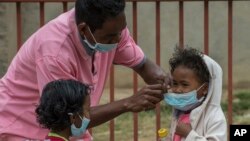The number of cases of plague in Madagascar has doubled during the past five days, according to the United Nations.
U.N. spokesperson Stephane Dujarric said Thursday as of Wednesday 1,032 cases were reported, 67 percent of which are pneumonic, which is more serious than bubonic plague.
So far 89 deaths have been recorded, including 13 on Tuesday.
Dujarric said the spread was "highly challenging" to control.
Medical teams in the country have stepped up efforts to combat the spread of the plague, but experts have said the situation will worsen if not rapidly funded.
Only 26 percent of the $9.5 million requested has been contributed, Dujarric said.
Pneumonic plague is a lung infection, transmitted through flea bites or from person to person through droplets in the air when someone coughs or sneezes. A person can die within 48 hours of the disease's onset if not treated with antibiotics. Symptoms of pneumonic plague include coughing, fever, chest pain and difficulty breathing.
While plague is a recurring problem in Madagascar, this particular outbreak has triggered a nationwide panic because it has moved from remote rural areas into the cities, including the capital, Antananarivo.
VOA's Margaret Besheer contributed to this report.





